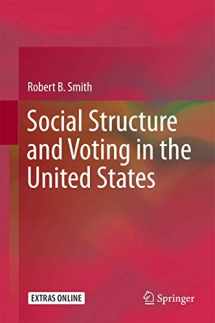
Social Structure and Voting in the United States
ISBN-13:
9789401774857
ISBN-10:
9401774854
Edition:
1st ed. 2016
Author:
Robert B. Smith
Publication date:
2016
Publisher:
Springer
Format:
Hardcover
429 pages
FREE US shipping
Book details
ISBN-13:
9789401774857
ISBN-10:
9401774854
Edition:
1st ed. 2016
Author:
Robert B. Smith
Publication date:
2016
Publisher:
Springer
Format:
Hardcover
429 pages
Summary
Social Structure and Voting in the United States (ISBN-13: 9789401774857 and ISBN-10: 9401774854), written by authors
Robert B. Smith, was published by Springer in 2016.
With an overall rating of 4.1 stars, it's a notable title among other
books. You can easily purchase or rent Social Structure and Voting in the United States (Hardcover) from BooksRun,
along with many other new and used
books
and textbooks.
And, if you're looking to sell your copy, our current buyback offer is $0.3.
Description
This book analyzes practical and moral influences on voting decisions. Undermining the widespread assumption that economic self-interest is the key determinant of voting choices, it discovers that moral considerations rooted in religious traditions are often the more decisive. This finding is confirmed through a close analysis of tangible problems, such as child neglect and crime, problems which one would expect to trouble practical voters. Further, this book suggests that political ideologies influence party affiliation, rather than the other way around. It defines four categories of states in terms of human development and income equality―South, Heartland, postindustrial, and “balanced.” It then explains why political color (red, purple, or blue) and societal problems vary across these categories. Voters’ moral ideologies, it shows, combine with a state’s measure of income equality and human development to shape a state’s readiness to pursue practical solutions to societal problems. Finally, it shows that moral ideologies of the religious right and authoritarianism, two very different concepts, are in fact intertwined empirically. This book thus suggests that education―a key driver of human development, anti-authoritarianism, and deliberative voting―should begin in preschools that are both nurturant and instructive.


We would LOVE it if you could help us and other readers by reviewing the book
Book review

Congratulations! We have received your book review.
{user}
{createdAt}
by {truncated_author}


